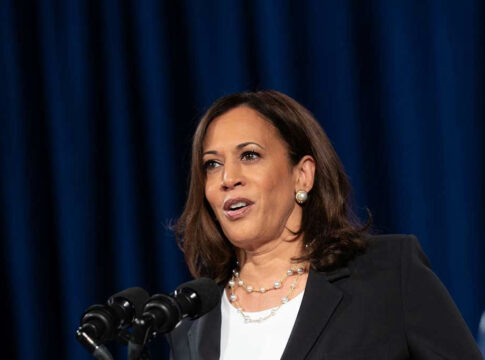Kamala Harris declared the American political system “broken” just months after losing her re-election bid—only to be skewered by her own party for indicting the very machine that built her storied career.
Harris’s “Broken System” Remark Ignites Intra-Party Firestorm
On July 31, 2025, Kamala Harris sat across from Stephen Colbert and, with more candor than calculation, declared her disillusionment: “To be very candid… I don’t want to go back in the system. I think it’s broken.” The audience murmured, but the real eruption came later. Within hours, Democratic strategists, activists, and influencers seized on her comments, not with sympathy, but with sharp irony. For decades, Harris had built her reputation as a steely prosecutor, a pragmatic senator, and the nation’s first female vice president. Now, her declaration struck many as a postscript to a career defined by maneuvering within the very machinery she now condemned.
Social media detonated with incredulity. Pundits reposted old clips of Harris championing incremental reforms, juxtaposed with her sudden rejection of the system. “Her whole career has been the system,” one commentator quipped, a sentiment echoed by prominent party voices. The spectacle wasn’t Republican schadenfreude—it was a family feud, a rare public lashing from Harris’s own ideological kin.
Why the Backlash Was Different—and Why It Matters
Washington is no stranger to former officials airing institutional grievances after leaving office. What set Harris’s remarks apart was their timing and their audience. This was not a measured critique aimed at voters or historians; it landed as a lament on late-night TV, just months after her electoral defeat. Democratic commentators interpreted it as an abdication of responsibility, if not outright hypocrisy. The sting was sharpened by her explicit promise to exit the political stage entirely—no gubernatorial run, no Senate comeback—leaving critics to ask: why voice such sweeping criticism only in defeat?
The optics mattered. Harris’s vice presidency, marked by declining approval ratings and policy stalemates, had already made her a lightning rod. Her exit interview, then, became a referendum not just on her career, but on the party’s broader struggles with leadership, accountability, and public trust. Critics argued that blaming the system after benefiting from it was an unforced error, undermining both her legacy and the party’s reformist bona fides.
Democratic Leadership at a Crossroads
The Harris controversy accelerated a leadership crisis brewing beneath the surface of Democratic politics. With Harris officially out of the running for California’s 2026 gubernatorial race—despite polling advantages and months of speculation—attention shifted to a new crop of contenders. Party strategists, sensing both risk and opportunity, began recalibrating their messaging to address voter frustration without echoing Harris’s fatalism. As one analyst put it, the party “must offer solutions, not just diagnoses,” especially with public confidence in institutions at a generational low.
Behind the scenes, power brokers debated how to frame Harris’s exit. Some called for a clean break, casting her remarks as a necessary catharsis that could spark renewal. Others feared a precedent: if party elders denounce the system only after losing, what incentive remains for meaningful reform from within? The intra-party debate spilled into newsrooms and think tanks, with opinion pages dissecting the implications for 2026 and beyond.
What Harris’s Farewell Reveals About American Politics
Harris’s “broken system” lament has become a Rorschach test for American democracy. Supporters argue her candor is overdue, a rare admission of institutional rot from a consummate insider. Detractors, meanwhile, see a self-serving gesture—too little, too late, and emblematic of a broader elite disconnect. The truth, as always, is more complicated. Harris’s exit underscores the tension between personal ambition and systemic reform, between the desire for change and the inertia of power.
For the Democratic Party, the episode is both warning and opportunity. The backlash against Harris may galvanize a new generation of leaders, wary of the pitfalls of complacency and eager to prove their reformist credentials. Or it may deepen cynicism, fueling the narrative that change comes only after power is lost. Either way, the echoes of Harris’s words—delivered in defeat, received with derision—will haunt the party’s next chapter, shaping debates over who leads, how they lead, and why the system remains so stubbornly resistant to change.

